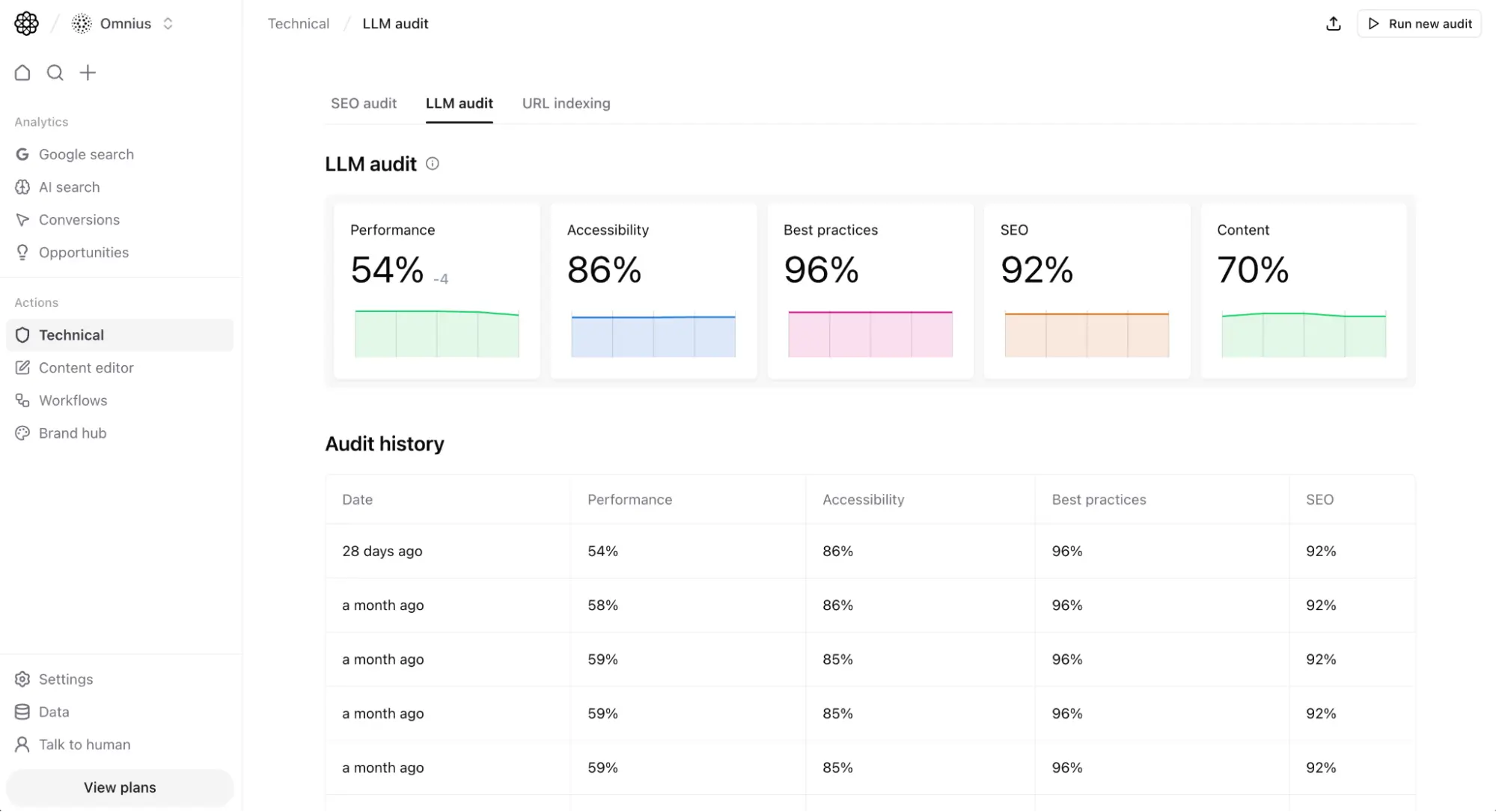






As AI-powered assistants and search interfaces become central to information discovery, visibility within LLM ecosystems has become a critical SEO dimension. Traditional SEO ensures that search engines crawl and rank content - but AI SEO determines whether that content is understood, cited, and surfaced by generative systems.
Atomic’s AI SEO Audit analyzes this intersection. It assesses how LLMs interpret, validate, and prioritize your web pages, using a unified scoring system across four core areas: Performance, Accessibility, Readiness, and SEO. The audit highlights structural and semantic improvements that directly influence a page’s discoverability in generative environments.
The audit operates through a multi-stage evaluation framework built on Atomic’s AI visibility methodology:
Each result is benchmarked against Atomic’s LLM Discoverability Index, which models how AI engines rank and recall content from training and retrieval sources.
The Overview panel presents four primary metrics:
Beneath these scores, Entity Trust Signals summarize how consistently the page communicates verifiable information about its brand, authorship, and topical authority. A low Entity Trust Signal Score (e.g., 17%) indicates missing structured data or unclear ownership signals - both critical for LLM confidence weighting.
Atomic’s audit framework combines three data systems:
Each metric is weighted according to its impact on AI visibility potential. For example, missing schema validation or outdated author markup can lower LLM trust even when SEO scores remain high.
In 2025, AI-driven discovery surfaces over 20% of organic search interactions through generative answers, summaries, or copilots. These systems rely on structured data, contextual signals, and entity reliability rather than traditional link-based ranking.
A page that performs well in standard SEO may still fail to appear in LLM-generated results if it lacks the semantic attributes AI systems use for validation. Atomic’s AI SEO Audit bridges that gap - ensuring that your content is both rankable in search and retrievable by LLMs.
Teams use the AI SEO Audit to:
For example, a finance company might discover that its product pages lack author schema and organizational identifiers. While Google indexes them normally, ChatGPT fails to cite them as authoritative sources. Implementing Atomic’s recommendations restores semantic trust - allowing the pages to reappear in AI-generated comparisons and summaries.
The AI SEO Audit integrates seamlessly with Atomic’s broader ecosystem:
Together, these modules form a closed-loop system for improving both traditional SEO rankings and AI-driven content discoverability.
The future of visibility depends on interpretability. As AI models increasingly mediate information delivery, websites must evolve beyond keyword optimization toward semantic precision and machine-trust validation. Atomic’s audit provides a technical foundation for that shift - quantifying how content is seen not just by search engines, but by the systems shaping the next generation of digital discovery.

Traditional SEO measures ranking within search engines. AI discoverability measures whether content is recognized and referenced by LLMs in generative responses or AI Overviews.
It reflects how verifiable and authoritative a page appears to AI systems. The score aggregates structured data presence, author metadata, and schema consistency.
Audits refresh weekly or after major content or schema changes. Results adjust dynamically as new data is indexed.
Yes. The system uses simulation models aligned with ChatGPT, Gemini, and Perplexity indexing patterns to approximate AI retrieval behavior.
LLMs process explicit and hierarchical content more effectively. Readability scores help ensure key information is extractable and semantically coherent.
Yes. Audit data integrates with Atomic’s Reports and Workflows modules for automated monitoring and recurring quality checks.
The system flags invalid or incomplete schema markup, identifies missing JSON-LD properties, and provides fix recommendations aligned with Google’s structured data standards.


Integrate your data sources with Atomic in as little as 4 minutes.

No coding, no complex setup, and no heavy learning curve.

Your data is visible only to you. Our system is completely encrypted.